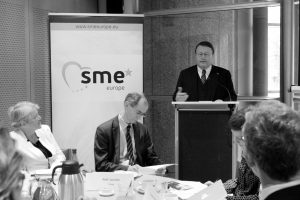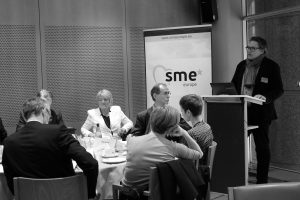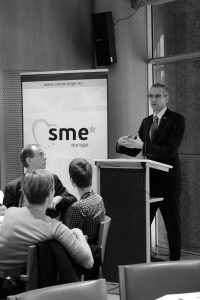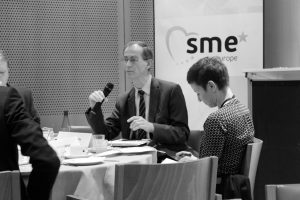How can we improve Online Payments for SMEs?
On 28th of February 2017, SME EUROPE of the EPP in cooperation with Friends of SMEs (a member of SME Connect), hosted an event in European Parliament considering the following thematic:„How can we improve Online Payments for SMEs?“ . The speakers consisted of Dr. Paul Rübig MEP (Honorary president of SME EUROPE), Eva Maydell MEP (Vice-President of SME EUROPE), Fabienne Weibel (Public Policy Director of BlaBlaCar), Pierre Petit (Deputy Director of DG Market Infrastructure and Payments, European Central Bank), Oliver Prothmann (President of the German Federal Association of eCommerce and Spokesman of Choice in eCommerce), Ivan Štefanec MEP (Vice President of SME EUROPE), and Ralf Jacobs (Head of Unit Retail, Financial Services and Payments, DG FISMA, European Commission).
Paul Rübig MEP started off the event and welcomed the guests to the event. He posed the question of how Europe and its citizens can move from the real world to the virtual world, and whether we have to significantly change our education system in order to reach this. He then went on to say that security and safety are essential to effective online payments, as well as the development language technology and activity for the sake of connectivity.
Eva Maydell MEP then officially introduced the topic of online payments and its relevance to SMEs in Europe. She initiated this by saying that consumers are always happy to see tangible results from policy makers and that even with existing platforms, SMEs are still challenged by making the leap into cross border business. Mrs. Maydell announced that Payments are an important factor in concluding a sale online. If it is easy and smooth for customers to pay, this reduces the risk of the shopping basket being abandoned and will increase conversion rates from browsing to sale. This means giving customers a choice between different payment methods. She was also very happy to SMEs active in developing their own solutions, a shining example of this, she said, is the PAYPLUG LABS project. An EU-funded project to design a simple and secure means of collecting online payments will enable more SMEs to efficiently and cost-effectively access the full potential of Europe’s burgeoning e-commerce market.
Fabienne Weibel took to the floor and presented BlaBlaCar as an original SME which has been hugely successful since its foundation in 2006 and has effectively developed its own online payments platform. BlaBlaCar is represented in over 22 countries and the average cost of a car share is 15 EUR. Mrs. Weibel is convinced that credible online payment platforms contributes to corporate common sense and is hugely responsible for upholding a reputation, especially for such a company as BlaBlaCar which depends on this online transactional activity. The main message conveyed by Mrs. Weibel to the regulators was to always ensure that an online payment system is not available to money launderers and fraudsters, but at the same time, that it is not too tiresome and arduous for everyday consumers. She ended by imploring that the regulatory bodies implement harmonization and proportionality wherever possible.
The representative from the European Central Bank, Pierre Petit then presented his thoughts in the first keynote speech and mentioned that SMEs offering goods and services faced three main regulatory areas: the first is instant payments, which is regulated by a central bank team dealing with the supply and demand aspects of online payment systems, the second is payment initiation service which has been allowed far more autonomy in terms of access to banking financial services thanks to a flexible framework provided by the European Commission, the third is eCommerce, which Mr. Petit feels is ideal for SMEs as it is a cheap and easy example of how digital platforms can process invoices or e-invoices in this case.
The second keynote speech was delivered by Oliver Prothmann who believes that trust in a company is built through an effective payment service system. He also mentioned that the following aspects are key contributors to an effective online payment system giving a company positive reputation: the right choice of system used tailored to the nature of the business concerned, a fast checkout, and “remember me functions” which constantly cut down arduous security procedures and increase user friendliness. Mr. Prothmann stated that today, almost 50% of transactions are made via the mobile phone, and that this of course causes even more concern for security. He finished up by saying that when people shop online, they want to buy the object in question immediately and not spend hours trying to buy it through arduous online procedures.
Ivan Štefanec MEP kicked off the impulse statements by stating that he feels online payment platforms should incorporate security, simplification and speed. He stated that the revised payment only concerns Europe and not the global theatre of online payments, and that we should remember that online payment regulation should be developed without borders and take the whole world into account.
The final impulse statement was conducted by Ralf Jacobs who brought DG FISMA´s analysis to the fore. According to Mr. Jacobs, the Commission´s strategy should reduce costs, improve security and help prevent market fragmentation. The interchange fee regulation will reduce costs by capping the fee itself. Mr. Jacobs is convinced that the directive (PSD2) has brought new players onto the scene. In terms of access, the directive gives everyone the right to online accounts, which has been made equally possible to people on low incomes, aged, and disabled users. As for security matters, strong customer representation is not always well portrayed, which can now be combatted by the European Banking Authority´s (EBA) recent authentication to allow transaction risk based analysis, which should make customer representation more achievable in the future. Universality, according to Mr. Jacobs is working in terms of cross border operation within the EU, but is still a remaining a hefty challenge which needs to be addressed in the future.










